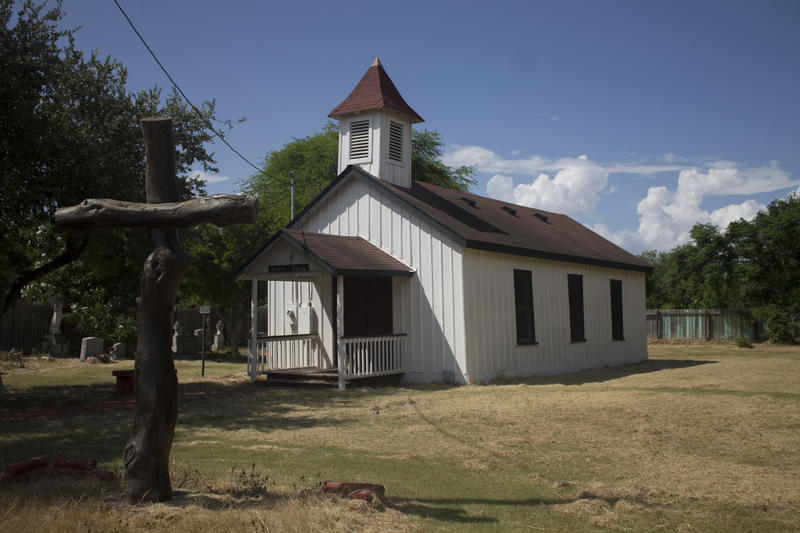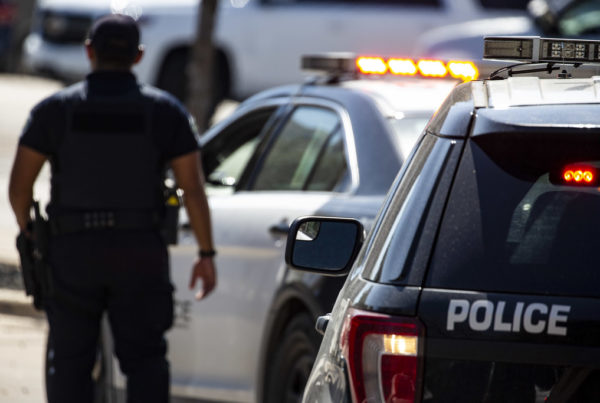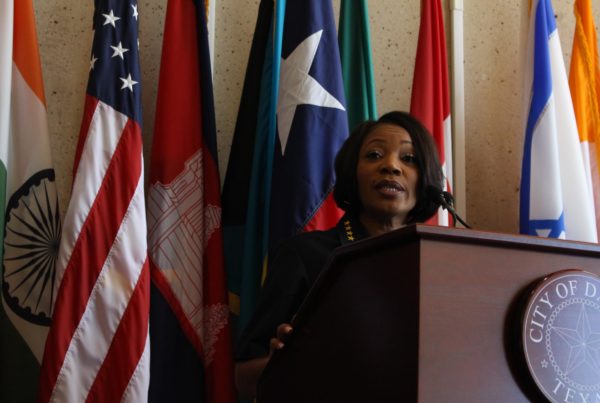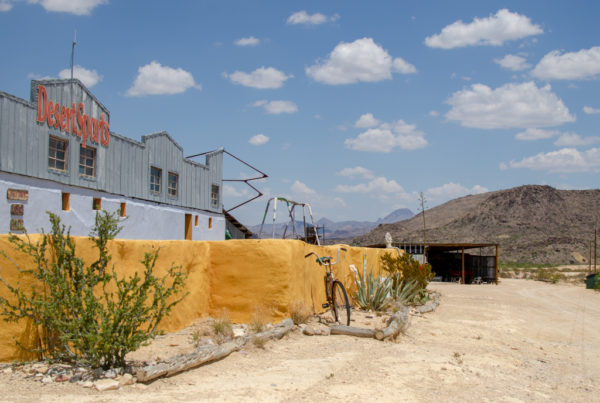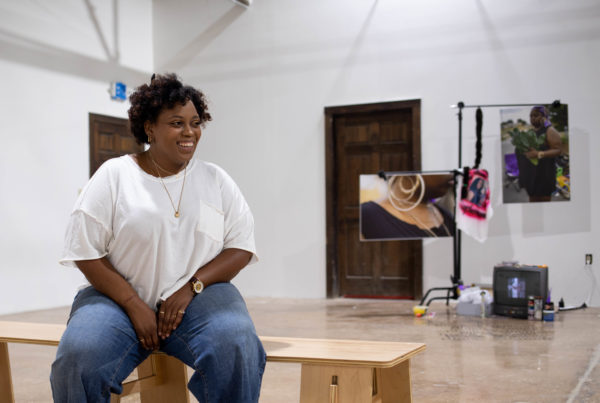From Texas Public Radio:
Ahead of the November election, President Trump’s administration said it is racing to build 10 miles of border wall a week.
Many of those projects along the Texas-Mexico border have been met with controversy, including one next to a historic cemetery in the Rio Grande Valley.
The sounds of heavy machinery can be heard within the Eli Jackson Cemetery as construction for the wall happens about 20 feet away.
“It is heartbreaking just to know that this horrible symbol of hatred — which is the wall for Trump — is going to be forever just hovering over our cemeteries, disturbing the peace of our ancestors,” said Sylvia Ramirez, whose family members are buried at Eli Jackson.
Ramirez said the machines have cleared out brush and trees that have left the ground bare.
“Ultimately we don’t know what’s going to happen with the cemeteries themselves,” said Ramirez. “They keep saying that they’re not going to build within the cemeteries – that’s the language that’s used in the 2020 appropriations law. But we have to see it to believe it.”
Just down the street from the Eli Jackson Cemetery is the Jackson Ranch Church and Cemetery.
Sylvia and her brother Ramiro said this land should be preserved because it is home to hidden history that many people don’t know about. It involves their great-great- grandparents.
“Nathaniel Jackson and Matilda Hicks, who was born into slavery, came from Alabama in 1857,” she said. “They were significant players in the Underground Railroad to the south, that is to Mexico. So, for people who were escaping slavery and were attempting to go into Mexico they would assist them via a ferryboat.”
By the time Nathaniel Jackson and Matilda Hicks arrived in south Texas, Mexico had already outlawed slavery, so they’d help others get into Mexico.
Ramiro said even though right now the construction of the wall isn’t happening within the cemetery, he and his sister still have concerns about the wall’s impacts.
“One of the reasons is flooding and that’s going to cause flooding in this area,” he said. “The other reason is that we’re going to be like a no man’s land. The fence is going to cut us off to the rest of the United States.”
Ramiro said they’re also worried about what type of access they will have to the cemeteries and church. In a statement to TPR, U.S. Customs and Border Protection said the church and cemeteries will continue to be accessible through two roads closest to these sites, but Ramiro says he hasn’t been given much information about that.
“It’s beyond me why they would tackle this extremely sensitive area that includes not only these cemeteries and historical church, but also essentially people’s homes,” Sylvia said. “There’s lots of open field going at least east, but they’re choosing for whatever reason to put the knife into the ribs right in this particular section. That I don’t understand and that angers me and I cannot get an answer for that.”
Ramirez said she was initially happy last year when she and her family heard the historic cemetery would be protected from border wall construction.
Congressman Henry Cuellar added language to an appropriations bill that said there would be no border wall construction within historic cemeteries and some other cultural and historic sensitive areas in the region.
Cuellar said he asked the Department of Homeland Security why the agency decided to build so close to the cemetery.
“Why are you poking the bear in the eye? And I said that to some of the Homeland folks. I said, ‘listen, you know what the law is, why do you have to do it right outside?’” Cuellar said. “I said, ‘look, you can go further up. You don’t have to do it right there,’ but they’re basically like, ‘well we’re just following the law,’ but the spirit of the law is that area. I mean you don’t want to have a fence one or two feet from within whatever territory we’re talking about.”
CBP told TPR, “It has never been CBP’s intent to disturb or relocate cemeteries that may lie within planned barrier alignment.”
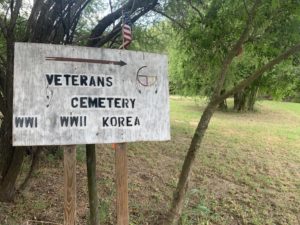
Veterans are buried in the Eli Jackson Cemetery, where border wall construction is happening 20 feet away.
CBP officials added that during construction activities, “the boundary of the cemetery and chapel will be clearly delineated and an environmental monitor will be present daily to ensure construction best management practices are adhered to by the construction contractor as well as to halt any work should any historical or culturally sensitive artifacts be identified.”
The Acting Department of Homeland Security Secretary Chad Wolf was scheduled to visit the Rio Grande Valley last week to announce the completion of 300 miles of border wall, but the trip was canceled because of Hurricane Laura.
Cuellar said that “300 miles” of border wall isn’t exactly an accurate figure.
“Those are replacement [miles]… there was a fence and they put a new one, or a double fence. That means there was a fence and they put another fence and a road. Those are the 300 miles they’re talking about,” Cuellar said, adding that they’ve only added five new miles of fencing where no border wall previously existed.
A CBP official said in a written statement that as of Aug. 28 their agency has, “constructed approximately 307 miles of new border wall system. This includes ~34 miles of new border wall system in locations where no barriers previously existed (~7 miles of primary and ~27 miles of secondary new border wall system).”
Cuellar said the Trump administration has also awarded multimillion dollar contracts to build border wall in areas where the government doesn’t own the land yet. He said this is a tactic by the Trump administration to try and obligate the next administration to continue building the border wall if President Trump loses the election to Democratic Challenger Joe Biden.
“How do we stop this? I have already told the appropriations committee that if there’s a change to Biden I will have the first action to stop the funding for any fence and it depends on Biden winning and I don’t think the Senate will fight us because they’re fighting us right now because of Trump,” he said. “And we’re going to defund the wall.”
Cuellar said if Biden wins, the congressman plans on helping move money back to the military that had been allocated to the border wall. He also said he is looking into whether or not they can remove some of the existing border wall.
People impacted by the wall expansion, like Sylvia and Ramiro Ramirez, are hopeful the election will put an end to some of these plans but they may not be able to wait it out until November. They’re being represented by EarthJustice, who is considering filing an injunction to stop the construction of the wall.


